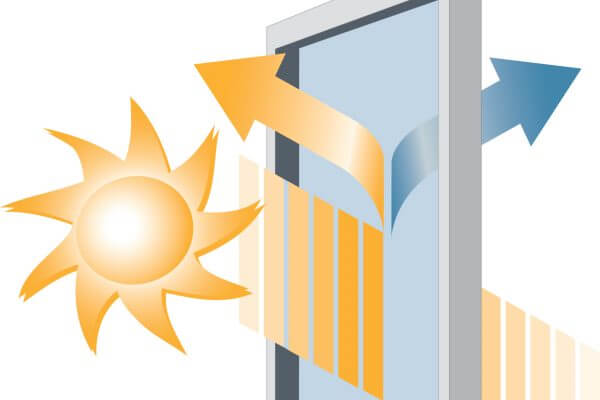Glass has remained a versatile and popular building material due to its thermal performance and constant solar control improvement. This performance can only be achieved through the use of solar control and passive emissive coatings. When light or heat energy is absorbed by a plan of glass, it either re-radiates or shifted away by the glass surface.
Emissivity is the ability of any material to irradiate energy, in other words, elements with higher reflection will have a low range emissivity. This is the essence of Low-E coated window glass. It is made up of microscopically small and transparent coating pattern to reflect massive rays of heat or infrared energy. Low-E window glass works like a Thermos because it reflects the energy inside the house to its original state when the heat energy inside tries to go outside especially during the winter.
Low-E window glass is a masterpiece for keeping the home constantly warm during winter and cold in summer times. Low-E is an acronym for low-emissivity, they are coated with materials of low emittance practically structured to bend back any form of heat from the outside.
Difference Between Low-E 180, 272 and 366 Glass
Low-E 180
This type of glass is a fantastic product that can be used for low range solar application. The Low-E 180 comes with 0.69 SHGC and 0.26 for glass U-factor. This glass with an active solar gain will keep the house always warm and cool in winter and summer respectively.
Low-E 272
This type of glass will guarantee comfort year-round, reflecting a balanced level of warmth into the room during winter and denying the ultraviolet rays and the heat of the sun in summer. The coating pattern of the Low-E 272 offers a high-level solar control performance that helps to reduce the total heat gained up to 50% when compared with the ordinary glass.
Low-E 366
This is the ultimate ultraviolet rays repellent and performance glass. It offers a high level of comfort all year round with energy-saving features. The coating pattern of Low-E 366 widow glass provides an ideal setting for high visibility and solar control, preventing over 90% of damaging rays from the sun.
Although there are other factors to consider (tint, size, and some aesthetic features) when thinking of what window to use. However, the role of Low-E window glass cannot be overestimated. It plays a significant role in every home (which affects the lighting, cooling, and heating cost of the entire building).
Low-E glass windows are made of ultraviolet repellent which is capable of taking out heat in the summer season. It also can absorb ultraviolet rays and permits heat inside the room during winter. So, the more insulated a window glass gets, the cozier it gets inside.
https://generation.yumilkax.com
https://generationagency.com.mx
https://legendarytourism.com.mx
https://oasisagencytravel.com.mx
sekolah tinggi ilmu kesehatan ukpm
kebidanan mitra sejahtera jakarta
akademi analis kesehatan muhammadiyah surabaya
akademi kesehatan lingkungan sumsel
akademi kebidanan arta kabanjahe
akademi kebidanan nusantara medan
akademi kebidanan delhus delmed
akper harapan mama deli serdang
akademi kebidanan bunga bangsa aceh
polres batam
polres bima
polres dago
polres denpasar
polres dumai
polres jakarta
polres jambi
polres mataram
polres sabang
polres samarinda
ponpes BabulUlum
ponpes BaitilHikmah
ponpes BUDi IHSAN
ponpes Ponpes Darul Amilin
Ponpes Darul Hidayahul
ponpes Darul Khairat
ponpes Darul Makmur
ponpes Darul Mifathurrahmah
ponpes Darul Muhsinin
ponpes Darussalam nuh
ponpes dayah darul
ponpes Dayah Syaikhuna
ponpes IhyaUlumuddin*
ponpes Insan Madani
ponpes Jabal Rahmah
ponpes Liqaur rahmah
Ponpes Madinat Uddini Yahbabul
ponpes Mafatih ussaadah
ponpes Nurul Hudas
ponpes Nurul Yaqin tengku
ponpes RAHMATUL HIDAYAH
Ponpes Raudha Tulala
ponpes Tahfidzul Qua
Ponpes Thariqun Najah
PRSI aceh
PRSI bandung
PRSI banjar
PRSI bekasi






